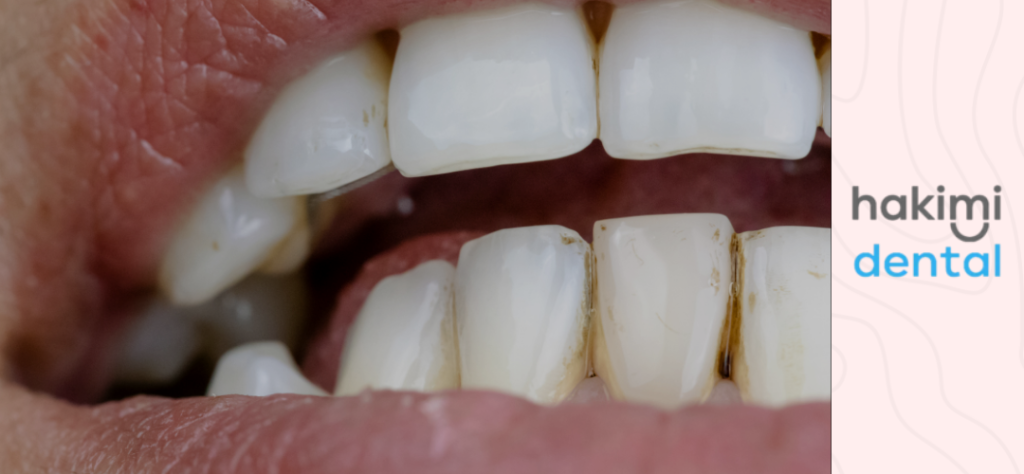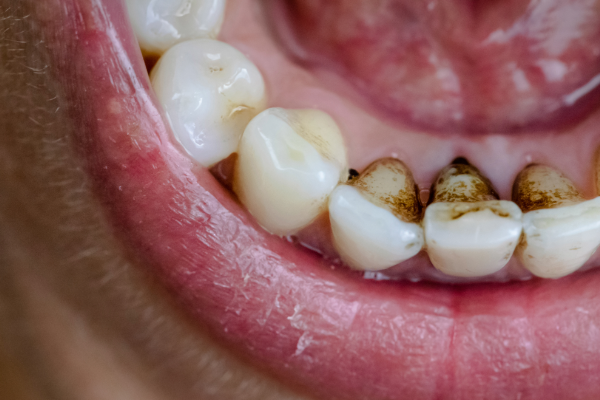Smoking is not only detrimental to your health but also to your smile. People are frequently concerned about smoking staining on their teeth.
This blog aims to explain why smoking stains teeth and how to effectively remove these unsightly blemishes, ensuring your smile remains as vibrant and healthy as possible.

Smoking stains
The interaction between cigarette smoke and tooth enamel is more than just surface-level. Tar and nicotine, the primary culprits behind the staining, are not inherently coloured. It’s when nicotine is combined with oxygen that it turns into a yellowish substance. Tar, on the other hand, is naturally dark.
When you smoke, these substances are inhaled and then come into contact with the surface of your teeth, where they begin their discolouration process.
How stains form
Tooth enamel, despite being the hardest substance in the human body, is not as smooth and impermeable as it might appear. It consists of microscopic pits and ridges that can hold particles of tobacco.
Over time, continuous exposure to tar and nicotine allows these substances to settle into these crevices, leading to the yellow or brown stains characteristic of smokers’ teeth.

The effects of smoking
It’s crucial to understand that smoking does more to your teeth than just leave marks. The very substances in cigarettes that cause those yellow or brown stains—tar and nicotine—also play a big part in increasing your chances of getting gum disease.
This happens because the chemicals from smoking mess with how your teeth and gums stick together, not to mention how they can also make your mouth produce less saliva. Less saliva means your teeth are more at risk for decay and other mouth infections.
Smoking really impacts the health of your mouth. It doesn’t just stop at risking gum problems; it goes further to increasing the chances of losing teeth and even getting mouth cancer. Cigarette chemicals are tough on the cells in your gums, making it harder for your mouth to fight back against infections. That’s why it’s not enough to just deal with the stains smoking leaves behind. It’s important to pay attention to the bigger picture and how smoking affects dental health and health as a whole.
How to remove smoke stains on teeth
Professional dental cleaning
One of the most effective ways to combat smoking staining on teeth is through professional dental cleanings. Dentists use specialised tools and techniques to remove plaque, tartar, and stains that regular brushing cannot. For stubborn stains, your dentist might recommend a more intensive cleaning procedure or even whitening treatments.
Taking care of your teeth at home
In addition to regular dental visits, maintaining a robust oral hygiene routine at home is as important. Use a whitening toothpaste approved by your dentist, and consider using an electric toothbrush for more effective stain removal. Flossing daily helps remove plaque and particles that can lead to staining, and rinsing with an antiseptic mouthwash can further reduce tar and nicotine residues.
Lifestyle changes
Quitting smoking is the most effective way to prevent further staining and improve your overall oral health. Understandably, quitting can be challenging, but support is available through various resources, including cessation programs and nicotine replacement therapies.
Preventing smoke stains on teeth
Understanding the broader implications of smoking on oral health highlights the necessity for proactive measures and clear solutions to mitigate these effects. While addressing smoking-related staining and its associated health risks, here are expanded strategies for maintaining oral health:
- Gradual reduction: If quitting smoking outright seems daunting, consider gradually reducing your smoking frequency. This can lower the risk of stains and improve oral health over time.
- Rinse after smoking: Make it a habit to rinse your mouth with water immediately after smoking. This simple action helps wash away some of the tar and nicotine before they can settle on your teeth, potentially reducing staining and the harmful impact on your gums and teeth.
- Use a special toothpaste: Toothpastes formulated for smokers can be more effective in removing tobacco stains. However, they should be used cautiously and not as a long-term solution, as they can be abrasive.
- Chew sugar-free gum: Chewing sugar-free gum stimulates saliva production, which is nature’s way of cleaning your mouth. Increased saliva flow helps rinse away harmful substances from cigarettes and combats dry mouth, a common issue for smokers.
Conclusion
Smoking can take a toll on your smile, leading to staining and serious oral health issues. However, with the right approach to dental care and lifestyle changes, it’s possible to mitigate these effects and maintain a healthy, radiant smile. Remember, your dentist is your ally in this journey, providing the necessary treatments and guidance to combat smoking staining on teeth effectively.
Embrace the journey towards a healthier smile today. Prioritising your dental health is a step towards a brighter, more confident you. If you’re concerned about smoking-related stains on your teeth or any other oral health issues, don’t hesitate to get in touch with our dental practice.
Our team is here to support you every step of the way!
FAQs
Yes, with professional dental treatments and proper oral hygiene, it’s possible to significantly reduce or even remove smoking stains. However, the success of these treatments often depends on the duration and intensity of your smoking habit.
Smokers should aim for at least two dental check-ups a year, though your dentist may recommend more frequent visits depending on your oral health status.
While home remedies like baking soda can temporarily reduce stains, they cannot replace professional cleaning’s effectiveness. Use such methods cautiously, as they can damage enamel if used improperly.
Yes, if you continue to smoke, stains can reappear. Maintaining a smoke-free lifestyle and adhering to a strict oral hygiene regimen is crucial for keeping your teeth stain-free.
No, it’s never too late to make a change! No matter how many years you’ve been smoking, dentists have a variety of options and expert advice to help bring back your smile. Reach out to us now to get the support and direction you need to start your journey towards a healthier mouth!
